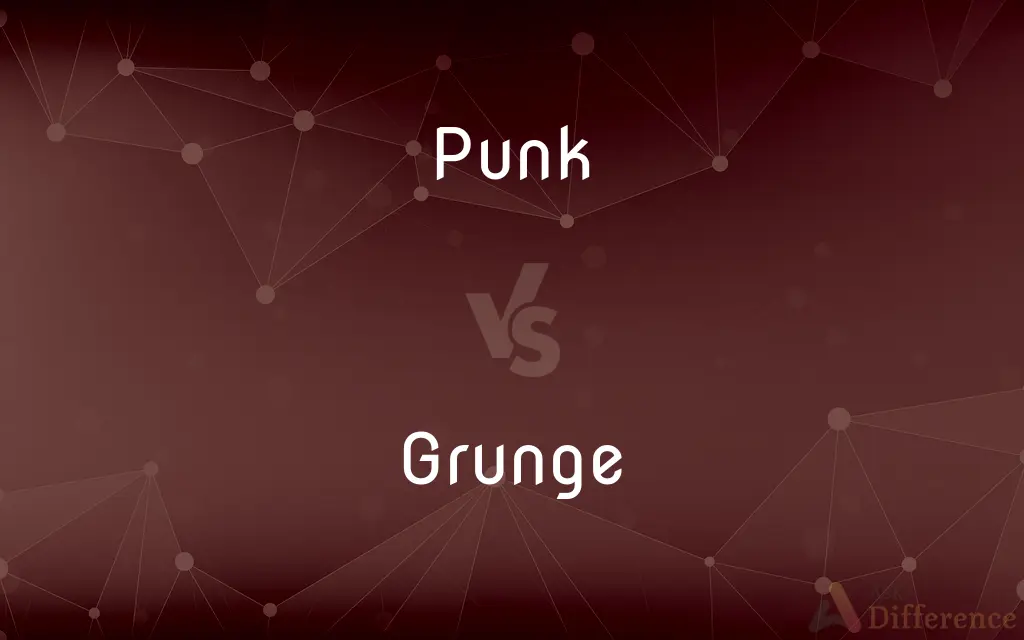Punk vs. Grunge — What's the Difference?
By Urooj Arif & Fiza Rafique — Updated on May 14, 2024
Punk is a fast-paced, rebellious rock music genre and cultural movement from the 1970s, characterized by simplicity and anti-establishment themes, while grunge emerged in the 1980s in Seattle, blending rock, punk, and metal with introspective lyrics.

Difference Between Punk and Grunge
Table of Contents
ADVERTISEMENT
Key Differences
Punk music originated in the mid-1970s as a rebellious response to the perceived excesses of mainstream rock music, emphasizing minimalistic arrangements, fast tempos, and politically charged lyrics. In contrast, grunge developed in the late 1980s in the Pacific Northwest, particularly Seattle, and it combines elements of punk rock, heavy metal, and indie rock, characterized by its distorted guitars, contrasting song dynamics, and introspective lyrics.
Punk bands like The Ramones and The Clash used straightforward chord progressions and shouted vocals to express anti-establishment sentiments and social critique. Meanwhile, grunge bands such as Nirvana, Pearl Jam, and Soundgarden explored themes of social alienation, despair, and disillusionment, often delivered with a mix of aggressive and softer, more melodic tones.
In terms of fashion, punk style is iconic for its DIY ethos, featuring ripped jeans, leather jackets, and spiked hair, often accessorized with chains and safety pins. Grunge fashion, on the other hand, is known for its "thrift-shop" aesthetic, including flannel shirts, oversized knit sweaters, and worn-out jeans, reflecting a more laid-back and disinterested attitude towards appearance.
The punk movement also fostered a DIY culture, encouraging fans and artists to create their own music and zines, promoting an ethos of self-sufficiency and direct action. Grunge, while initially part of an underground scene, became widely popular and commercialized in the early 1990s, leading to a significant impact on mainstream fashion and music, though it often retained a sense of authenticity and skepticism towards commercial success.
Both punk and grunge reflect a disillusionment with societal norms, but they express this discontent in different musical styles and cultural expressions, with punk being more overtly confrontational and grunge more reflective and moody.
ADVERTISEMENT
Comparison Chart
Origins
Mid-1970s
Late 1980s, Seattle
Musical Style
Fast tempos, simple chords, raw sound
Slower tempos, heavy distortion, mix of soft and loud dynamics
Themes
Anti-establishment, rebellion
Alienation, despair, disillusionment
Fashion
Leather jackets, ripped jeans, spikes
Flannel shirts, knit sweaters, worn jeans
Cultural Impact
DIY ethos, punk zines, indie labels
Mainstream success, significant influence on 90s culture
Compare with Definitions
Punk
A cultural movement known for its distinctive style and anti-establishment attitudes.
The punk scene was not just about music but a full-blown cultural rebellion.
Grunge
A subgenre of alternative rock that emerged in the mid-1980s in Seattle.
Grunge music is known for its apathetic and somber lyrics mixed with aggressive compositions.
Punk
Emphasizes a DIY approach to art and music production.
They started their own record label, embracing the punk ethos of doing it yourself.
Grunge
Known for its "Seattle Sound" and association with flannel and unkempt appearances.
The grunge movement was as much a fashion statement as it was a musical one.
Punk
A loud, fast-moving, and aggressive form of rock music, popular in the late 1970s
Punk had turned pop music and its attendant culture on its head
Grunge
Bands like Nirvana brought grunge to the mainstream in the early 1990s.
Nirvana's success catapulted grunge from an underground movement to a major market force.
Punk
A worthless person (often used as a general term of abuse)
You think any of these punks they got fighting today could stand up to Joe Louis?
Grunge
Retains a legacy of influencing both music and fashion.
The echoes of grunge aesthetics can still be seen in today’s fashion trends.
Punk
Soft, crumbly wood that has been attacked by fungus, used as tinder.
Grunge
Lyrics often explore themes of existential angst and disillusionment.
Grunge lyrics frequently reflect feelings of disconnection and frustration with society.
Punk
Relating to punk rock and its associated subculture
A punk band
A punk haircut
Grunge
Grunge (sometimes referred to as the Seattle sound) is an alternative rock genre and subculture that emerged during the mid-1980s in the American Pacific Northwest state of Washington, particularly in Seattle and nearby towns. Grunge fuses elements of punk rock and heavy metal, but without punk's structure and speed.
Punk
In poor condition
I felt too punk to eat
Grunge
(Informal) Filth; dirt.
Punk
Trick or deceive
His friends punked him and told him that she was having a party, which is why he showed up unannounced
The Associated Press got punked with a fake tweet
Grunge
Rock music that incorporates elements of punk rock and heavy metal, often expressing a bleak or nihilistic outlook.
Punk
An often aggressive or violent young person
The building was set on fire by a bunch of punks.
Grunge
(informal) Dirt or filth, especially when difficult to clean.
The cinema floor was covered in grunge deposited by the crowds.
Punk
An inexperienced young person
We don't want that little punk tagging along.
Grunge
(informal) The state of being filthy; grubbiness.
Chad used to work as a coal miner, but couldn't handle the constant grunge.
Punk
A cowardly or weak young person
Don't let him disrespect you—show him you're not a punk.
Grunge
(music genre) A subgenre of alternative rock, originating from Seattle, Washington, which melds punk and metal.
Alice liked to wear plaids and ripped jeans, and listen to grunge.
Punk
Punk rock.
Grunge
The state of being covered with unclean things
Punk
A punk rocker.
Punk
(Archaic) A prostitute.
Punk
Dry decayed wood, used as tinder.
Punk
Any of various substances that smolder when ignited, used to light fireworks.
Punk
Chinese incense.
Punk
To act in a cowardly manner. Often used with out.
Punk
To humiliate (someone). Often used with down or out.
Punk
To dupe or deceive.
Punk
To play a practical joke on.
Punk
Of poor quality; worthless.
Punk
Weak in spirits or health.
Punk
A worthless person, particularly:
Punk
Syn of fellow: any person, especially a male comrade.
Punk
(pejorative) A petty criminal, especially a juvenile delinquent.
Punk
(pejorative) sissy: a weak, timid person.
Punk
Syn of amateur.
Punk
A young, untrained animal or worker.
Punk
, a genre known for short, loud, energetic songs with electric guitars and strong drums.
Punk
(countable) nodot=a, a musician known for playing punk rock or a fan of the genre.
Punk
(uncountable) The larger nonconformist social movement associated with punk rock and its fans.
Punk
(uncountable) Any material used as tinder for lighting fires, such as agaric, dried wood, or touchwood, but especially wood altered by certain fungi.
Punk
(countable) A utensil for lighting wicks or fuses (such as those of fireworks) resembling stick incense.
Punk
Worthless, contemptible, particularly
Punk
Bad, substandard.
Punk
Thuggish, criminal.
Punk
Cowardly.
Punk
Poorly, sickly.
Punk
Inexperienced.
Punk
Of or concerning punk rock or its associated subculture.
You look very punk with your t-shirt, piercing, and chains.
Punk
(slang) To pimp.
Punk
To prank.
I got expelled when I punked the principal.
Punk
(especially with "out") To give up or concede; to act like a wimp.
Jimmy was going to help me with the prank, but he punked (out) at the last minute.
Punk
To adapt or embellish in the style of the punk movement.
Punk
Wood so decayed as to be dry, crumbly, and useful for tinder; touchwood.
Punk
A fungus (Polyporus fomentarius, etc.) sometimes dried for tinder; agaric.
Punk
An artificial tinder. See Amadou, and Spunk.
Punk
A prostitute; a strumpet.
Punk
An aggressive and violent young criminal
Punk
Substance that smolders when ignited; used to light fuses (especially fireworks)
Punk
Material for starting a fire
Punk
A teenager or young adult who is a performer (or enthusiast) of punk rock and a member of the punk youth subculture
Punk
Rock music with deliberately offensive lyrics expressing anger and social alienation; in part a reaction against progressive rock
Punk
Of very poor quality
Punk
A rock music genre characterized by short, fast-paced songs with hard-edged melodies and singing styles, and a stripped-down instrumentation.
Punk music often features politically charged lyrics that challenge societal norms.
Punk
Fashion includes elements like spiked hair and leather jackets.
His punk fashion boldly displayed his rebellious spirit.
Punk
Associated with aggressive and confrontational performance styles.
The band's punk performance energized the crowd.
Common Curiosities
Can grunge be considered a descendant of punk?
Yes, grunge is often considered a descendant of punk, incorporating its raw energy and ethos while adding heavier musical elements and more introspective lyrics.
What defines punk music?
Punk music is defined by its fast tempos, simple structures, and anti-establishment themes.
What are the key characteristics of grunge music?
Grunge music features a blend of distorted electric guitars, contrasting song dynamics, and lyrics that often express alienation and despair.
How did punk influence popular culture?
Punk had a profound impact on music, fashion, and art, promoting a DIY ethic and an anti-authoritarian ethos.
Why did grunge become so popular in the 1990s?
Grunge resonated with a wide audience due to its raw authenticity, angst-filled lyrics, and the charisma of bands like Nirvana and Pearl Jam.
How do punk and grunge differ in their approach to fashion?
Punk fashion is deliberately confrontational and makeshift, while grunge fashion adopts a more casual, distressed look that suggests indifference.
How do punk and grunge reflect their respective eras?
Punk reflects the socio-political turmoil and youth rebellion of the 1970s, while grunge mirrors the economic uncertainties and cultural disillusionment of the late 1980s and early 1990s.
What led to the decline of punk?
While punk never completely disappeared, its mainstream visibility waned as the movement became more commercialized and the music scene evolved.
What caused the decline of grunge?
Grunge declined as its leading bands disbanded or changed direction, and as the music industry shifted towards more polished productions.
What is the legacy of punk and grunge today?
Both genres have left a lasting impact on music and culture, influencing a wide range of music styles and continuing to inspire fashion and art.
Share Your Discovery

Previous Comparison
Bloke vs. Guy
Next Comparison
Airstrip vs. RunwayAuthor Spotlight
Written by
Urooj ArifUrooj is a skilled content writer at Ask Difference, known for her exceptional ability to simplify complex topics into engaging and informative content. With a passion for research and a flair for clear, concise writing, she consistently delivers articles that resonate with our diverse audience.
Co-written by
Fiza RafiqueFiza Rafique is a skilled content writer at AskDifference.com, where she meticulously refines and enhances written pieces. Drawing from her vast editorial expertise, Fiza ensures clarity, accuracy, and precision in every article. Passionate about language, she continually seeks to elevate the quality of content for readers worldwide.
















































